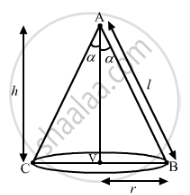Advertisements
Advertisements
Question
Show that the semi-vertical angle of the cone of the maximum volume and of given slant height is `cos^(-1)(1/sqrt3)`
Solution
Let us consider the following variables:
h = height of the cone
l = slant height of the cone (given)
r = radius of the base of the cone
α = semi vertical angle of the cone

Let us assume that V' is the volume of the cone which has to be maximised.
We know that
`V' = 1/3πr^2h ...(1)`
From the figure, we have:
`l^2=r^2+h^2⇒l^2−h^2=r^2`
On substituting the value of r2 in equation (1), we get:
`V' = 1/3π(l^2−h^2)h=1/3π(l^2h−h^3) `
On differentiating with respect to h, we get:
`dV'/dh=1/3π(l^2−3h^2) ...(2)`
For maximum volume of V, let us put `(dV')/(dh)=0.`
So, from equation (2), we have:
`1/3π(l^2−3h^2)=0⇒h=l/sqrt3 (∵ h,l >0)`
Again, differentiating equation (2) with respect to h, we get:
`(d^2V'/dh^2)=1/3π(−6h)=−2πh`
`∴ ((d^2V')/(dh^2))_(h=l/sqrt3)=−2πl/sqrt3<0`
Thus, the volume of the cone is maximum at
`h=l/sqrt3`
From the figure, we have:
`cosα =h/l⇒cosα =l/lsqrt3=1/sqrt3`
`⇒α=cos^(−1)(1/sqrt3)`
∴ The semi-vertical angle is
`cos^(−1)(1/sqrt3). `
RELATED QUESTIONS
Differentiate logx 3 ?
Differentiate \[\sqrt{\frac{1 + \sin x}{1 - \sin x}}\] ?
Differentiate \[\log \left( x + \sqrt{x^2 + 1} \right)\] ?
Differentiate \[\frac{e^x \log x}{x^2}\] ?
Differentiate \[e^x \log \sin 2x\] ?
Differentiate \[3 e^{- 3x} \log \left( 1 + x \right)\] ?
\[\log\left\{ \cot\left( \frac{\pi}{4} + \frac{x}{2} \right) \right\}\] ?
If \[y = x \sin^{- 1} x + \sqrt{1 - x^2}\] ,prove that \[\frac{dy}{dx} = \sin^{- 1} x\] ?
Differentiate \[\tan^{- 1} \left\{ \frac{x}{1 + \sqrt{1 - x^2}} \right\}, - 1 < x < 1\] ?
If \[y = se c^{- 1} \left( \frac{x + 1}{x - 1} \right) + \sin^{- 1} \left( \frac{x - 1}{x + 1} \right), x > 0 . \text{ Find} \frac{dy}{dx}\] ?
Find \[\frac{dy}{dx}\] in the following case \[\tan^{- 1} \left( x^2 + y^2 \right) = a\] ?
If \[\sqrt{1 - x^2} + \sqrt{1 - y^2} = a \left( x - y \right)\] , prove that \[\frac{dy}{dx} = \frac{\sqrt{1 - y^2}}{1 - x^2}\] ?
If \[xy \log \left( x + y \right) = 1\] ,Prove that \[\frac{dy}{dx} = - \frac{y \left( x^2 y + x + y \right)}{x \left( x y^2 + x + y \right)}\] ?
If \[\tan \left( x + y \right) + \tan \left( x - y \right) = 1, \text{ find} \frac{dy}{dx}\] ?
Differentiate \[x^{\cos^{- 1} x}\] ?
Differentiate \[{10}^\left( {10}^x \right)\] ?
Differentiate \[x^\left( \sin x - \cos x \right) + \frac{x^2 - 1}{x^2 + 1}\] ?
If \[y = \sqrt{\log x + \sqrt{\log x + \sqrt{\log x + ... to \infty}}}\], prove that \[\left( 2 y - 1 \right) \frac{dy}{dx} = \frac{1}{x}\] ?
Find \[\frac{dy}{dx}\], When \[x = a \left( \theta + \sin \theta \right) \text{ and } y = a \left( 1 - \cos \theta \right)\] ?
Differentiate \[\sin^{- 1} \left( 2x \sqrt{1 - x^2} \right)\] with respect to \[\tan^{- 1} \left( \frac{x}{\sqrt{1 - x^2}} \right), \text { if }- \frac{1}{\sqrt{2}} < x < \frac{1}{\sqrt{2}}\] ?
If \[f'\left( 1 \right) = 2 \text { and y } = f \left( \log_e x \right), \text { find} \frac{dy}{dx} \text { at }x = e\] ?
If \[\pi \leq x \leq 2\pi \text { and y } = \cos^{- 1} \left( \cos x \right), \text { find } \frac{dy}{dx}\] ?
If \[x = a \cos^3 \theta, y = a \sin^3 \theta, \text { then } \sqrt{1 + \left( \frac{dy}{dx} \right)^2} =\] ____________ .
Find the second order derivatives of the following function log (sin x) ?
Find the second order derivatives of the following function log (log x) ?
If y = x + tan x, show that \[\cos^2 x\frac{d^2 y}{d x^2} - 2y + 2x = 0\] ?
If y = ae2x + be−x, show that, \[\frac{d^2 y}{d x^2} - \frac{dy}{dx} - 2y = 0\] ?
If y = |x − x2|, then find \[\frac{d^2 y}{d x^2}\] ?
If \[\frac{d}{dx}\left[ x^n - a_1 x^{n - 1} + a_2 x^{n - 2} + . . . + \left( - 1 \right)^n a_n \right] e^x = x^n e^x\] then the value of ar, 0 < r ≤ n, is equal to
